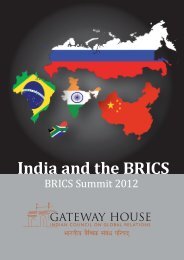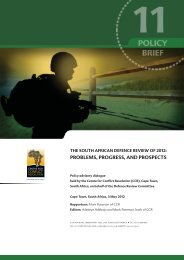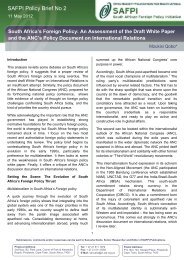P O L I T I C A L R E F O R M SPrime Minister Manmohan Singh being briefed about supercomputer PARAM at the India-Tanzanian Centre for Excellence in Informati<strong>on</strong> andCommunicati<strong>on</strong> Technology, in Dar es Salaam, Tanzania, <strong>on</strong> May 27, 2011.defined governance as “the manner in which power isexercised in the management of a country’s ec<strong>on</strong>omic andsocial resources for developing, creating and sustaining anenvir<strong>on</strong>ment which fosters str<strong>on</strong>g and equitabledevelopment (Skinner E, 2000).Good governance required agreater pre-occupati<strong>on</strong> with thecreati<strong>on</strong> of an enabling frameworkfor development, larger resp<strong>on</strong>sibilitiesfor the private sector, areducti<strong>on</strong> in direct governmentinvolvement in producti<strong>on</strong> andcommercial activity and thedevoluti<strong>on</strong> of power from the centreto lower levels of government.In this light, a state pursuing goodgovernance would do the following:actively fight corrupti<strong>on</strong> andthe use of public office for privategain; enhance democratic procedures, instituti<strong>on</strong>s andprinciples; institute limited terms for key public offices;reduce government in size and functi<strong>on</strong>s; remove ec<strong>on</strong>omicc<strong>on</strong>trol; privatise state enterprises; establish and enforcecodes of c<strong>on</strong>duct; and, promote independent and effectivejudiciary (Hulme D. and Turner M., 1997:11-12). Thepertinent questi<strong>on</strong> is: what can <str<strong>on</strong>g>Africa</str<strong>on</strong>g> learn from India, aseas<strong>on</strong>ed democracy and <strong>emerging</strong> world power? What canIndia <strong>on</strong> its part offer as far as democratic transformati<strong>on</strong> in<str<strong>on</strong>g>Africa</str<strong>on</strong>g> is c<strong>on</strong>cerned? In other words, how can Indo-<str<strong>on</strong>g>Africa</str<strong>on</strong>g>nPerhaps the advent ofEuropean col<strong>on</strong>ialismcatalysed even moreinteracti<strong>on</strong> between Indiansand <str<strong>on</strong>g>Africa</str<strong>on</strong>g>ns. Indianlabourers were used tofacilitate the entry ofcol<strong>on</strong>ial expediti<strong>on</strong> in mostof Sub-Saharan <str<strong>on</strong>g>Africa</str<strong>on</strong>g>cooperati<strong>on</strong> provide fertile grounds for democratictransformati<strong>on</strong> for the latter?IndIa-afrIcan relatI<strong>on</strong>s In retrospectIndia and <str<strong>on</strong>g>Africa</str<strong>on</strong>g> have had unique and comm<strong>on</strong>historical experiences. Internati<strong>on</strong>altrade between India and <str<strong>on</strong>g>Africa</str<strong>on</strong>g> datesback several centuries (Amutabi,2009). Perhaps the advent ofEuropean col<strong>on</strong>ialism catalysedeven more interacti<strong>on</strong> betweenIndians and <str<strong>on</strong>g>Africa</str<strong>on</strong>g>ns. India wasGreat Britain’s most valued col<strong>on</strong>ialpossessi<strong>on</strong>. It was particularly thegreatest source of cheap labourfor the col<strong>on</strong>ial empire. Indianlabourers were used to facilitatethe entry of col<strong>on</strong>ial expediti<strong>on</strong>in most of Sub-Saharan <str<strong>on</strong>g>Africa</str<strong>on</strong>g>.Subsequently, Indian soldiers and their <str<strong>on</strong>g>Africa</str<strong>on</strong>g>ncounterparts found themselves serving the col<strong>on</strong>isers’interests during the First and Sec<strong>on</strong>d World Wars.Thousands lost their lives in these wars. So<strong>on</strong> after theend of the Sec<strong>on</strong>d World War, India led the way in thedecol<strong>on</strong>isati<strong>on</strong> process (Jioreman 2006, 190-210).The dem<strong>on</strong>strati<strong>on</strong> effect by Indian nati<strong>on</strong>alism led byMahatma Gandhi and subsequent independence in 1947str<strong>on</strong>gly influenced the rise of <str<strong>on</strong>g>Africa</str<strong>on</strong>g>n nati<strong>on</strong>alism inthe same directi<strong>on</strong> during the 1950s and 1960s. At44August 2011-January 2012
A F R I C A Q U A R T E R L Yindependence, most <str<strong>on</strong>g>Africa</str<strong>on</strong>g>n states formed even str<strong>on</strong>gerbilateral ties with India, paving the way for enhanced trade,commercial and industrial relati<strong>on</strong>s (D’Souza, 2008). It isnoteworthy that India remained at the forefr<strong>on</strong>t of theUnited Nati<strong>on</strong>s-led campaign against apartheid in South<str<strong>on</strong>g>Africa</str<strong>on</strong>g> and closely partnered with <str<strong>on</strong>g>Africa</str<strong>on</strong>g> under theOrganisati<strong>on</strong> of <str<strong>on</strong>g>Africa</str<strong>on</strong>g>n Unity (OAU) banner. At the sametime, India was a forerunner in champi<strong>on</strong>ing Third Worldinterests right from the Bandung Declarati<strong>on</strong>s 1955, theGroup of 77 and the N<strong>on</strong>-Aligned Movement (NAM)(Abraham I. 2008, 195-219).These platforms of South-South cooperati<strong>on</strong> andengagement at the United Nati<strong>on</strong>s platform were used not<strong>on</strong>ly to agitate for the recogniti<strong>on</strong> ofSouthern interests and c<strong>on</strong>cerns ina Western-dominated internati<strong>on</strong>alpolitical ec<strong>on</strong>omy, but also topresent a solid stand at the height ofthe Cold War and its arms race thatthreatened the world with nuclearannihilati<strong>on</strong>. These historical andcomm<strong>on</strong> experiences between<str<strong>on</strong>g>Africa</str<strong>on</strong>g> and India perhaps paved theway for str<strong>on</strong>ger ties with <str<strong>on</strong>g>Africa</str<strong>on</strong>g>ncountries for more than fourdecades. At the beginning of the21st century, Indian investments in<str<strong>on</strong>g>Africa</str<strong>on</strong>g> ranged from small retailholdings in the remotest partsof <str<strong>on</strong>g>Africa</str<strong>on</strong>g>, to multinati<strong>on</strong>alinvestments ranging from oilexplorati<strong>on</strong>, manufacturing, real estate, banking, insurance,and c<strong>on</strong>structi<strong>on</strong> works, just to name but a few.IndIa’s democratIc experIence: less<strong>on</strong>sfor afrIcaIn a discussi<strong>on</strong> of India’s democratic experience and theless<strong>on</strong>s for democratic transformati<strong>on</strong> in <str<strong>on</strong>g>Africa</str<strong>on</strong>g>, it wouldbe crucial to begin by examining <str<strong>on</strong>g>Africa</str<strong>on</strong>g>’s governanceexperience. At independence, <str<strong>on</strong>g>Africa</str<strong>on</strong>g>n political leaders werefaced with several key challenges. First, they differed <strong>on</strong> thebest strategy to promote development in their countries.However, they agreed substantially over methods.The “instrument of both diagnosis and remedy was thedevelopment plan”.There were three opti<strong>on</strong>s as far as development planningwas c<strong>on</strong>cerned. The first <strong>on</strong>e was the western model ofdevelopment planning (also known as the Indicative Model).This essentially Western model allowed for politicalec<strong>on</strong>omy to be shaped by market forces with limitedstate interference. The sec<strong>on</strong>d was the socialist modelof development planning (also known as centralised orimperative model). The third was a model that adopted whatappeared like a blend of the capitalist and socialist models;hence, most <str<strong>on</strong>g>Africa</str<strong>on</strong>g>n leaders chose to adopt centrallyAt the beginning of the 21stcentury, Indian investmentsin <str<strong>on</strong>g>Africa</str<strong>on</strong>g> ranged from smallretail holdings in theremotest parts of <str<strong>on</strong>g>Africa</str<strong>on</strong>g> tomultinati<strong>on</strong>al investmentsranging from oilexplorati<strong>on</strong>, manufacturing,real estate, banking,insurance, andc<strong>on</strong>structi<strong>on</strong> works, just t<strong>on</strong>ame but a fewc<strong>on</strong>trolled development planning that was to operatewithin a mixed ec<strong>on</strong>omy — <strong>on</strong>e in which both the public andprivate sectors played an important role. Somecountries, however, chose to follow a purely socialist modelin which the state c<strong>on</strong>trolled the ec<strong>on</strong>omy in terms of whoproduces what and in what quantities. This was applied incountries like Tanzania under Dr. Julius Nyerere,Mozambique under Samora Machel, Libya under Gaddafiand Guinea under Sekou Toure (Thoms<strong>on</strong> Alex: 2004, 1-23).At the same time, <str<strong>on</strong>g>Africa</str<strong>on</strong>g>n political leaders were facedwith the great challenge of uplifting the standards of life oftheir peoples through the provisi<strong>on</strong> of basic needs and thecreati<strong>on</strong> of a favourable envir<strong>on</strong>ment by government —<strong>on</strong>e that would engender ec<strong>on</strong>omicgrowth and the creati<strong>on</strong> ofnati<strong>on</strong>al wealth. Another challengewas associated with the ideologicalpath that was to guide the developmentprocess. <str<strong>on</strong>g>Africa</str<strong>on</strong>g>n countriesattained political independenceat a time when the internati<strong>on</strong>alpolitical system was str<strong>on</strong>glyshaped, c<strong>on</strong>diti<strong>on</strong>ed and divided bythe Cold War. The choice wasthree-fold: whether to adopt thesocialist ideology or adopt thecapitalist ideology or even declaretheir support for the N<strong>on</strong>-AlignedMovement. Most <str<strong>on</strong>g>Africa</str<strong>on</strong>g>n countrieschose to be n<strong>on</strong>-aligned andevolved their own ideological styleunder the rubric of <str<strong>on</strong>g>Africa</str<strong>on</strong>g>n socialism (Tordoff W., 2003,140-150).In reality, however, <str<strong>on</strong>g>Africa</str<strong>on</strong>g>n regime elites traded <strong>on</strong>esuper power against another depending <strong>on</strong> which <strong>on</strong>esuited them best and ensured their c<strong>on</strong>tinued stay in power.<str<strong>on</strong>g>Africa</str<strong>on</strong>g> became a battlefield for proxy wars between thesocialist Eastern Bloc and the capitalist Western Bloc. InWestern leaning systems, dissidents and/or belligerentgroups were branded socialist/Marxist, while in Easternleaning systems dissidents and/or oppositi<strong>on</strong> groups andindividuals were branded imperialist elements and agents ofneo-col<strong>on</strong>ialism. The sad reality, however, was that asstruggles for power, c<strong>on</strong>trol and influence took place in<str<strong>on</strong>g>Africa</str<strong>on</strong>g> in the name of “weeding out” either socialist orimperialist elements, the noble aspects of politics andnati<strong>on</strong>al development were lost. In essence, Cold Warpolitics catalysed bloody civil wars and forms of totalitarianregimes regardless of which side of the ideological dividethese countries bel<strong>on</strong>ged — it bred <str<strong>on</strong>g>Africa</str<strong>on</strong>g>n totalitariandictators such as Jean Bedal Bokassa in the Central <str<strong>on</strong>g>Africa</str<strong>on</strong>g>nRepublic, Mobutu of Zaire (now C<strong>on</strong>go DRC), Somaliaunder Siad Barre and Ethiopia under Mengistu HaileMariam (Nzau M. 2007).There is another line of argument. At independence,August 2011-January 2012 45





